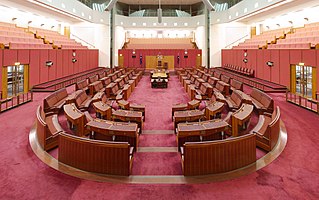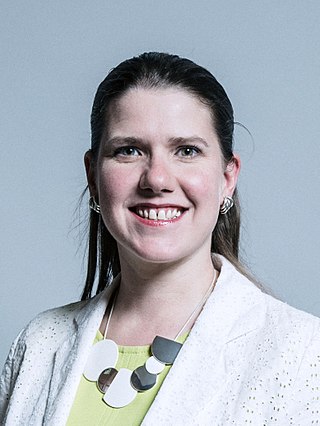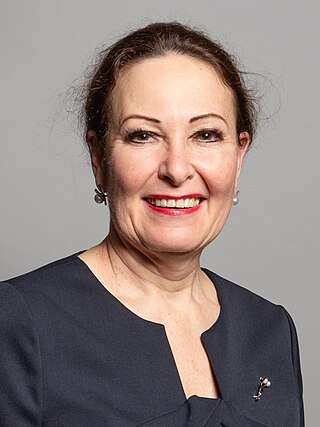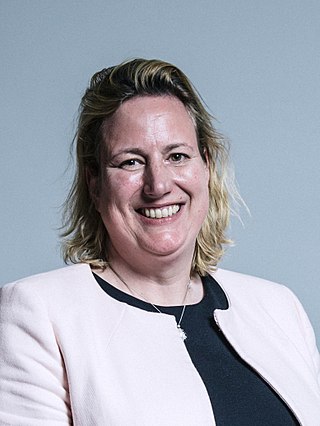Related Research Articles

The United Kingdom is a constitutional monarchy which, by legislation and convention, operates as a unitary parliamentary democracy. A hereditary monarch, currently King Charles III, serves as head of state while the Prime Minister of the United Kingdom, currently Sir Keir Starmer since 2024, serves as the elected head of government.

In some parliamentary systems, politicians are said to cross the floor if they formally change their political affiliation to a political party different from the one they were initially elected under. In Australia though, this term simply refers to Members of Parliament (MPs) who dissent from the party line and vote against the express instructions of the party whip while retaining membership in their political party.

Dominic Charles Roberts Grieve is a British barrister and former politician who served as Shadow Home Secretary from 2008 to 2009 and Attorney General for England and Wales from 2010 to 2014. He served as the Member of Parliament (MP) for Beaconsfield from 1997 to 2019 and was the Chair of the Intelligence and Security Committee from 2015 to 2019.
The Chief Whip is a political leader whose task is to enforce the whipping system, which aims to ensure that legislators who are members of a political party attend and vote on legislation as the party leadership prescribes.

Joanne Kate Swinson is a former British politician who was Leader of the Liberal Democrats from July to December 2019. She was the first woman and the youngest person to hold the position, as well as the shortest-serving holder of the post. Swinson was the first leader of the Liberal Democrats to be defeated in their own constituency. Swinson was Member of Parliament (MP) for East Dunbartonshire from 2005 to 2015 and 2017 to 2019. In September 2020, Swinson became Director of Partners for a New Economy (P4NE).

Jason Alexander McCartney is a British Conservative Party politician who was the member of Parliament (MP) for Colne Valley in West Yorkshire from 2019 to 2024, and from 2010 to 2017. He is a former TV sports reporter.

Anne Marie Morris is a former British Conservative politician and lawyer, who represented Newton Abbot as a Member of Parliament (MP) between May 2010 and May 2024. During her 14 year term in office, she twice lost the party whip for a period of nine months between July and December 2017, and then again between January and May 2022.

Antoinette Geraldine Mackeson-Sandbach, known as Antoinette Sandbach, is a barrister, farm manager and politician who was elected as a North Wales region Member of the Welsh Assembly at the May 2011 election, and subsequently elected Member of Parliament for Eddisbury in Cheshire at the 2015 general election.

The 2019 United Kingdom general election was held on Thursday, 12 December 2019, with 47,567,752 registered voters entitled to vote to elect 650 Members of Parliament (MPs) to the House of Commons. The governing Conservative Party led by the prime minister, Boris Johnson, won a landslide victory with a majority of 80 seats, a net gain of 48, on 43.6 per cent of the popular vote, the highest percentage for any party since the 1979 general election, though with a narrower popular vote margin than that achieved by the Labour Party over the Conservatives at the 1997 general election. This was the second national election to be held in 2019 in the United Kingdom, the first being the 2019 European Parliament election.
On 15 January 2019, a motion of no confidence in the government of Theresa May was tabled in the House of Commons. On 16 January, the House rejected the motion by a vote of 325 to 306.

A by-election was held in the UK Parliament constituency of Brecon and Radnorshire on 1 August 2019 after Chris Davies, who had held the seat for the Conservatives since the 2015 general election, was unseated by a recall petition. The by-election was won by Jane Dodds of the Liberal Democrats.
On 3 September 2019, the British Conservative Party withdrew the whip from 21 of its MPs who had supported an emergency motion to allow the House of Commons to undertake proceedings on the European Union (Withdrawal) Bill on 4 September. In the hours after the vote, the Chief Whip Mark Spencer informed the rebel MPs that they were no longer entitled to sit as Conservatives. This led to the loss of the Conservative/DUP majority in the Commons.

The 2019 United Kingdom general election was held on 12 December 2019 to elect all 650 members of the House of Commons, including the 40 Welsh seats.
The 2020 Liberal Democrats leadership election was held in August 2020, after Jo Swinson, the previous leader of the Liberal Democrats, lost her seat in the 2019 general election. It was initially set to be held in July 2020, but due to the COVID-19 pandemic it was delayed by six weeks, having been at first postponed until May 2021.
In July 2022, a motion of confidence in the second Johnson ministry was tabled in the House of Commons. The motion, debated on 18 July, was laid by the government itself after it had refused to allow time for a Labour Party no-confidence motion. The Government won the vote on 18 July, but the Prime Minister resigned in September.
References
- ↑ New Zealand House of Representatives Standing Orders, sections 155-156.
- ↑ news.com.au, 28 Sept 2010: Tony Abbott gets tough on pair for Julia Gillard
- ↑ The Australian, 29 Sept 2010: Tony Abbott puts federal ministers under virtual house arrest
- ↑ Michelle Rowland granted pair to care for sick baby
- ↑ Sydney Morning Herald, 9 Sept 2011:Abbott agrees to pair for Thomson
- ↑ "Greens senator Scott Ludlam takes leave to fight depression and anxiety". Fairfax Media. 4 November 2016.
Senator Ludlam will be offered a "pair" in the Senate - by which a single vote is sacrificed on the opposing side of debates to cancel out his absence - as long as is required.
- ↑ Labor's fire service rejig goes pear-shaped after paired pair reappear
- ↑ "House of Commons Debates, 15th Parliament, 1st ... - Canadian Parliamentary Historical Resources". parl.canadiana.ca. Retrieved 2024-06-17.
- ↑ "Opinion: Civility, that's the word - The Globe and Mail". The Globe and Mail. 17 May 2005.
- ↑ Aitken, Ian; Cole, Peter (27 May 1976). "Red Flag is waved at the Tory bull". The Guardian .
- ↑ D'Arcy, Mark (2012-10-25). "Passing of a legend". BBC News. Retrieved 2020-06-04.
- ↑ Bevins, Anthony; Brown, Colin (18 December 1996). "Now they're getting dirty" . The Independent. Archived from the original on 2022-05-24.
- ↑ Pidd, Helen (2018-06-20). "Ailing MP wheeled into Commons in pyjamas criticises Tory whips". The Guardian. ISSN 0261-3077 . Retrieved 2020-06-04.
- ↑ Sabbagh, Dan; Elgot, Jessica (2018-07-19). "Jo Swinson pairing row: Conservatives admit chief whip asked MPs to break arrangements". The Guardian. ISSN 0261-3077 . Retrieved 2020-06-04.
- ↑ Taylor, Harry (29 January 2019). "Tulip Siddiq: Victory for MP on proxy voting in House of Commons after delaying son's birth for Brexit vote". Hampstead Highgate Express. Retrieved 2020-06-04.
- ↑ "U.S. Senate Roll Call Votes 115th Congress - 2nd Session". U.S. Senate. U.S. Government Publishing Office. October 6, 2018. Archived from the original on October 7, 2018. Retrieved October 6, 2018.
- ↑ "Brett Kavanaugh to Be Rare Beneficiary of Senate Paired Voting". Roll Call. 6 October 2018. Retrieved 2020-12-30.